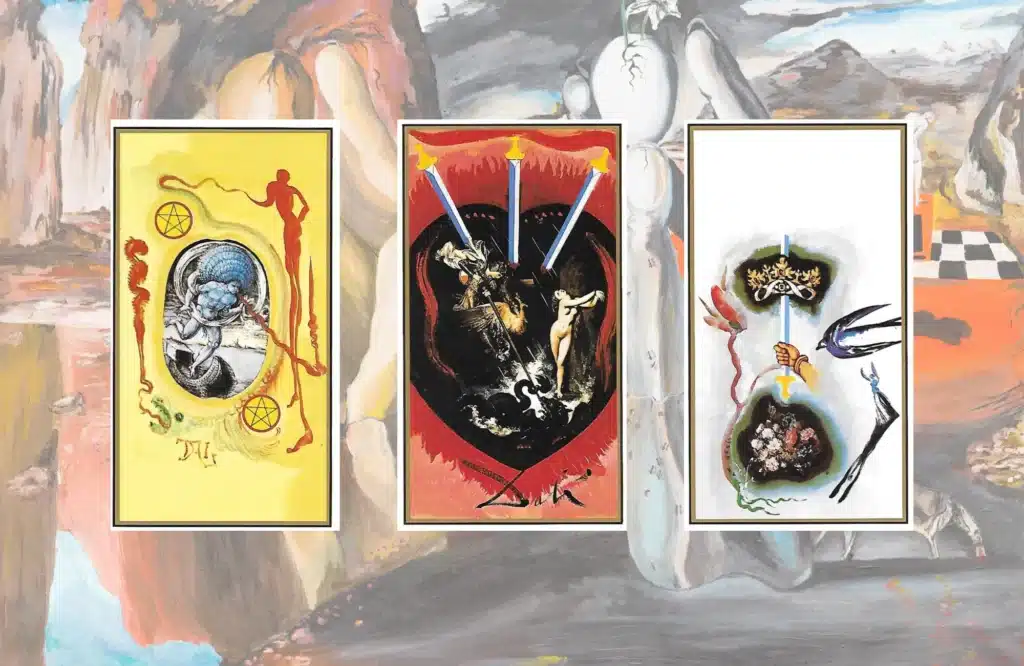Every month, Amazon, Etsy, crowd-funding platforms, and bookstores release numerous tarot and oracle decks. There are now thousands of decks available, ranging from new releases to out-of-print ones. Reviewing a deck helps readers decide whether to purchase it, focusing on factors like card quality, artwork, and guidebook usefulness. This month, I’ve chosen to critique The Salvador Dali Tarot.
The Cards
Who was Salvador Dali?
Salvador Dalí was a Spanish surrealist artist known for his eccentric personality and provocative, dreamlike works. Born on May 11, 1904, in Figueres, Spain, Dalí’s exposure to Impressionism and Renaissance masters influenced his unconventional paintings style. He trained at the Royal Academy of Fine Arts of San Fernando, where he developed his unique talent. Dalí became internationally famous for his striking and often bizarre imagery. One such visual was the melting clocks in his iconic painting The Persistence of Memory. His work challenged the norms of artistic expression, merging realistic technique with the irrational.
Deck Review: The Dungeons and Dragons Tarot
Dalí’s creativity extended beyond painting, as he dabbled in sculpture, filmmaking, and photography, always pushing boundaries. A key figure in the Surrealist movement, Dalí had a flamboyant persona, eccentric behavior, and controversial ideas. His work displayed his fixation on sexuality, death, and the subconscious. His legacy as an influential artist remains impactful, with his works still celebrated worldwide.
Salvador Dalí created a surrealist tarot deck in the 1970s, blending his iconic dreamlike imagery with the traditional structure of tarot. The deck features his unique artistic style, with vivid colors and bizarre, symbolic imagery that challenges conventional tarot interpretations. Dalí’s deck stands out for its psychological depth, often delving into themes of transformation, desire, and the unconscious mind. The deck was not widely published during his lifetime. However, collectors and those interested in the intersection of art and mysticism seek this deck out today.
Publication History
The Salvador Dalí Tarot deck, also known as the Tarot Universal Dalí, has several editions since its initial release in 1984. The Spanish company Naipes Comas produced the original edition. In the 2000s, the German publisher Königsfurt-Urania took over, releasing updated versions. In 2019, a newly-packaged edition by Taschen revitalized interest in this iconic deck. Each edition varies slightly, particularly in packaging and card presentation, but all feature Dalí’s surrealist artwork.
Deck Review: The Nightfall Tarot by Amory Abbott
Card Stock and Shuffling
Printed on medium card stock, these cards feature a semi-gloss finish and rounded corners. They are challenging to riffle shuffle because they are larger than standard tarot cards. If you have small hands, you will probably need to use an overhand shuffle to mix the cards. Thankfully, the semi-gloss finish prevents the cards from sticking together when first removed from the box. With their high-quality card stock, these cards are durable and will last for many years, even with extended use.
Artwork and the Visual Accessibility of the Salvador Dali Tarot
The artwork for this deck is spectacular. However, it is not visually accessible regarding many of the cards. Dali is not everyone’s cup of tea. As a result, you will need to study the book to become familiar with the meanings of many of the cards. You will not be able to look at them and clearly know the meaning.
The High Priest
Meaning:
The High Priest represents spiritual wisdom and inner guidance. His surreal depiction emphasizes a deep connection to higher knowledge and the mysteries of the unconscious. The card invites you to trust your intuition, seek enlightenment, and embrace wisdom that transcends traditional understanding or material concerns.
Ace of Cups
Meaning:
The Ace of Cups symbolizes the beginning of emotional or spiritual fulfillment. The surreal imagery reflects the birth of new emotional experiences, inner peace, or creative flow. This card invites you to open your heart, embrace love, and explore your emotional depth with fresh, untainted enthusiasm.
7 of Swords
Meaning:
The 7 of Swords represents deception, secrecy, or an underhanded approach to a situation. The card’s imagery suggests the complexity of hidden motives or mental manipulation. It advises caution, urging you to examine your actions and others’ intentions.
Explanation of the Cards
The 1984 deck comes with a very concisely-written guidebook that only explains the meanings of the Major Arcana. The newest edition by Taschen (2019) has a more complete guidebook by Johannes Fiebig. Since Dali’s imagery pulls from history, mythology, and religion, having the more complete guidebook is really necessary.
Tarot Deck Review: The Marvel Tarot by Syndee Barwick and Lily McDonald
Usefulness
Reading with the Salvador Dalí Tarot can be both fascinating and challenging. The surreal and intricate artwork often requires deep reflection and interpretation, as Dalí’s images deviate from traditional symbolism. While the deck invites intuition interpretation, its abstract style may make it difficult for beginners to grasp the meanings immediately. Each card presents a complex narrative, offering multiple interpretations, demanding a blend of analytical thinking and emotional sensitivity. This deck is ideal for those with experience or a willingness to engage in introspective exploration.
Rating of the Salvador Dali Tarot
The Salvador Dalí Tarot earns a solid 3 out of 5 stars. The deck’s surreal and visually captivating artwork offers a unique and thought-provoking experience. However, its abstract and sometimes ambiguous imagery makes it challenging for beginners or those unfamiliar with Dalí’s work. The symbolism, though rich and deep may not appeal to those seeking a straightforward reading. On the other hand, for seasoned tarot readers or art enthusiasts, the deck provides a fascinating, transformative journey.
Where to Buy this Deck
If you like the Salvador Dali Tarot and wish to purchase a copy, you can do so online.
The post Deck Review: The Salvador Dali Tarot appeared first on askAstrology.

